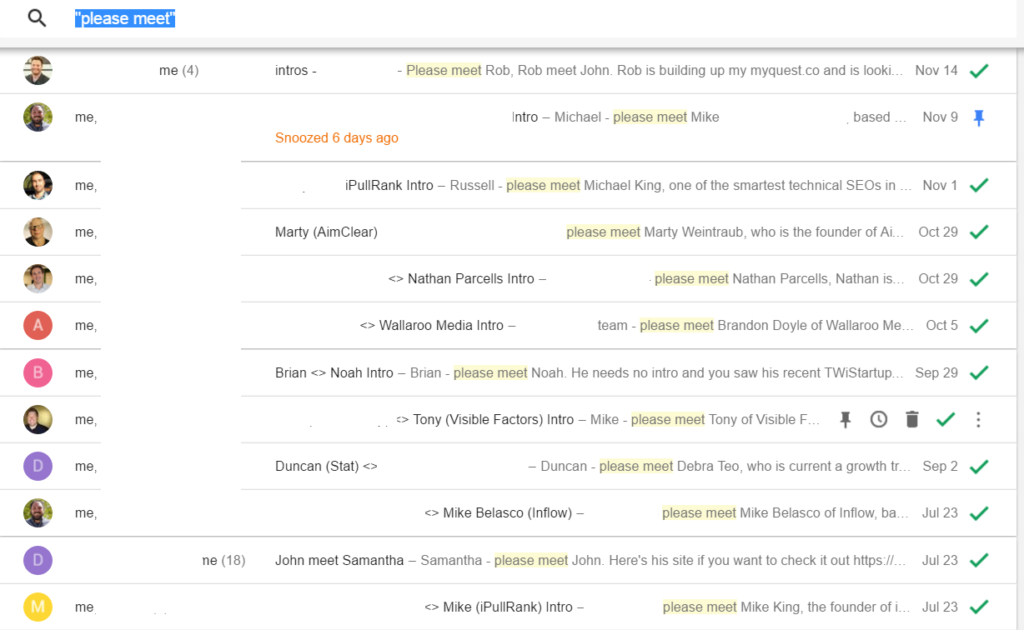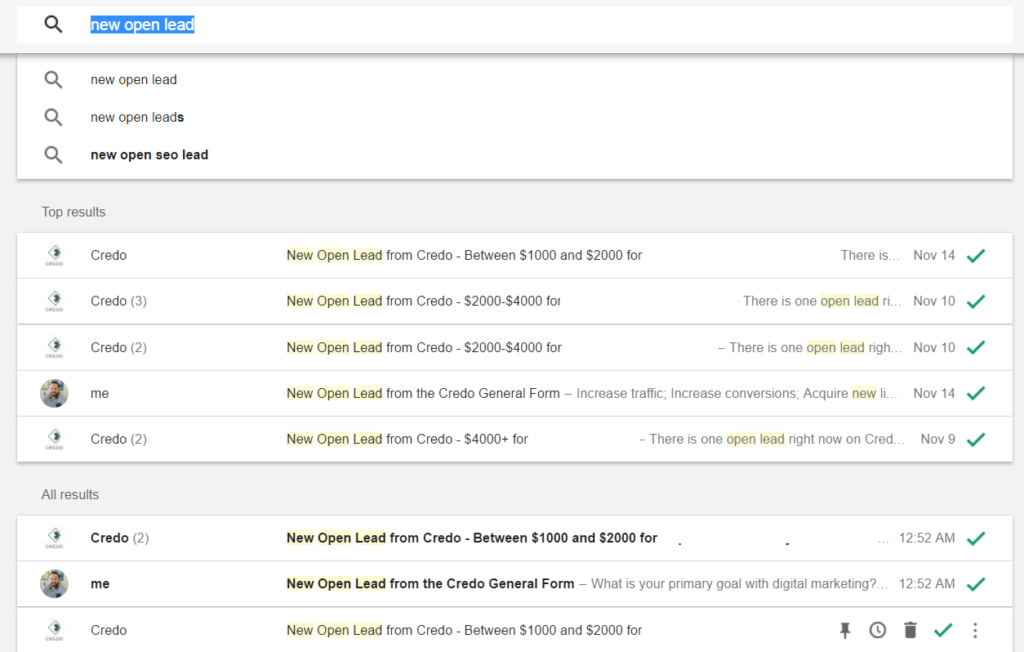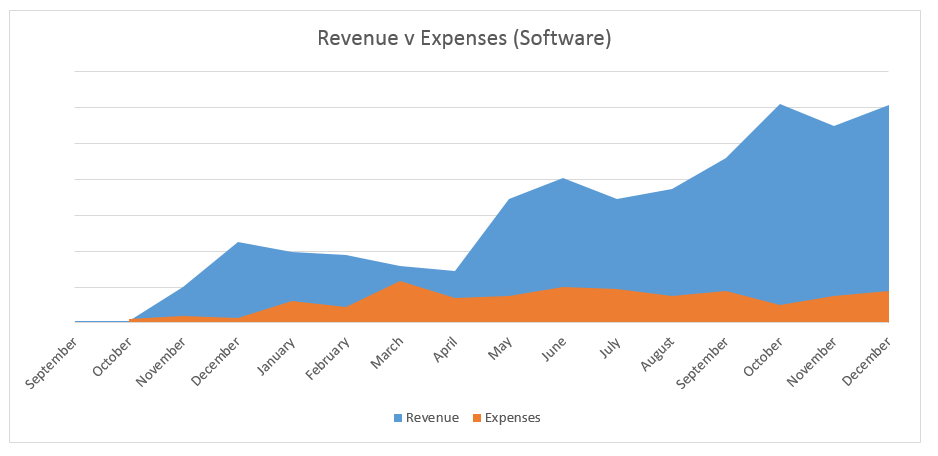Most of my friends are building their own search marketing agencies these days, and they’re succeeding beyond their wildest expectations. Many of them have 5-15 employees, are doing seven figures a year in revenue, and are doing fantastic work for their clients.
I often get the question (I was asked it twice just this past week) “Have you thought about building an agency? You could be incredibly successful at it.” I smiled.
Most say this because of my software company GetCredo.com which generates 80+ SEO and digital marketing leads each month, and growing. These leads are anywhere from $1000 to over $10000 per month, so ostensibly I could cherry pick the best ones off the top and build an agency where I would not have the main issue most agencies have – consistent deal flow.
And you know what? These friends are probably right. They are well meaning and genuinely want me to succeed in my business. They see an opportunity to generate lots of revenue, and then that I am not seizing it, so they wonder either what I am thinking (and that I’m being dumb) or what they are missing that I see that makes me not want to build my own agency.
And honestly, they’re not wrong. I am purposefully not seizing that huge revenue opportunity of an agency, and the people asking these questions are also missing something if they’ve never built their own agency. As I think about it, none of the people asking me why I’m not building an agency have ever built their own.
The response I sent to one of the question askers was this:
“I’m building a software company because it affords me the kind of lifestyle I want to live. An agency requires more people if you want to grow beyond just a consultancy, and that’s not what i want right now.”
To go deeper, why am I not building an agency? A few reasons:
- Scale-ability of software excites me
- Agencies have huge financial overhead that software does not
- Customer service is fundamentally different in software
Let’s talk about these.
Software Scalability
Software has infinite financial upside and scale if you build your service correctly. Agencies can only really grow by a combination of two things – 1) better processes to manage more clients combined with 2) bigger headcount to deliver the work.
Software is different. If you have the right people on board you can grow much faster with fewer people than in an agency. I have finite brain space and time available to deliver work such as audits or ongoing strategy, and I have discovered over time that the maximum number of consulting clients I can manage well at once is three. 3. To grow consulting revenue beyond that (if I wanted to), I’d have to either raise my prices substantially (which is difficult to do though possible) or bring on others to help me deliver the work, which would cut into my margins.
Software can scale much more with less manual work, because you can automate many things. In fact, as I have been running my software company I have increasingly realized that in order to grow my company I have to constantly ask myself what I am doing manually that should instead be automated. You cannot automate or outsource everything, but you can automate most things.
This may betray a personal flaw, but it is a trait that I see in many entrepreneurs (and is espoused in books like The E-Myth Revisited). This is, in order to automate something which in turn allows your company to grow faster than if it was done manually, you must first understand what is actually involved in the process and if that process meets a real need. If it does, then you seek to automate it. If it does not, then you keep doing it manually and trying new things until you find the right solution. Only then do you automate it.
For example, I did manual intros for months:

And now these are automated so I can concentrate on other things while pros still get leads:

The same principles can apply to many agencies and consultancies, of course. As you figure out the different problems your clients face routinely you can turn some of the solutions into established processes that are solved via specific tools. I know some agencies who have invested fairly heavily in technology in order to scale their agency while avoiding the “you can only grow as you bring on new employees” agency trap.
But at the end of the day, agencies are much harder to grow this way than a software company. And I do not want to build a huge operation, but rather a great lifestyle business that provides great financial upside for my family and employees that I eventually bring on board. So I’m building a software company.
Financial Overhead
Agencies require two things – people and clients. You also have accounts receivable, HR, finance, account management (often), and your subject matter experts. All of this costs a lot of money. If each person can only take on a finite amount of work, that means that as your client roster grows so will your salary expenses (and with that your HR, office, and other expenses).
I do agree that the math can work out where bringing someone on to help deliver the work can result in higher revenue and profit. Let’s do a math experiment:
If you are personally able to bring on 3 clients at $5k each (so $15,000 in revenue per month, which is a fantastic income by the way) and have expenses of say $1000 per month, you make a net profit before taxes of $14,000 every month, which is $168,000 per year. Not bad!
($15,000 – $1,000) x 12 = $168,000 with one person
If you can service 6 clients at $5k/month each ($30,000 per month revenue) when you bring someone on for $5k/mo ($60,000 per year), you make $24,000 per month in revenue which is $288,000 per year.
($30,000 – $6000) x 12 = $288,000 with two people
So the revenue grows with each person that you bring on ideally, but the company becomes more and more complex with each additional head and client.
Software, especially subscription businesses like mine, do not require this. I do pay a bookkeeper (Bench.co) to take care of my books and I have an accountant on retainer for my taxes. But my expenses are relatively finite at the moment – hosting, paying contractors who do work that is outside of my scope of skill, and lead generation activities (advertising, content production, etc). These do not grow with every new customer that I bring onto the platform.

Payments from software clients are never late (except for the odd failed credit card charge), unlike consulting clients where any number of things can happen – they may delay payment for essentially any reason, their net payment terms may take up to two months to pay you after your invoice is submitted, they may object that the work is not done, they may hold your payment as they try to coerce more work out of you than you signed a contract for, or they may not even pay you at all. It’s a terrible truth, but it has happened to almost every consultant or agency I know. And trust me when I say that chasing down late payments is one of the worst parts of consulting. On a positive note for freelancers and consultants, some states are finally making it illegal to not pay freelancers (this is way too late in coming, by the way). That’s how unsure consulting income can be.
With a recurring revenue model, your revenue is always growing off of a base. In fact, many RRM companies I know do not benchmark themselves monthly or quarterly off their overall revenue growth but off their percentage growth from their base. And as explained above, your expenses do not have to grow linearly.
Customer Service and Communication Differences
Supporting software customers is very different from working with consulting clients. This is one of the bigger lessons I’ve learned as I’ve grown Credo.
Consulting Communication
As a consultant, you must communicate with them via phone or email consistently. With my consulting clients, I try to speak with them on the phone or video conference at least once a week, and usually on email every day or two. I’m constantly communicating to them what I am doing and why, and with that also committing to deadlines and specific things that they need done.
This is what a great consultant does (communicates, delivers on time, does quality work based off their expertise), and this is necessary to running a successful consulting business.
Software Communication
Software is a bit different. As I think about what I do to keep in touch with Credo’s customers and how I communicate with them, there are three main things I do:
- Periodic update emails (at least monthly) to communicate with the whole base how the previous month went and what is planned for the upcoming month.
- Answering customer emails that have questions or are alerting me to issues with the platform. Clear communication here as to how to do something or what will be corrected is imperative.
- Talking on the phone to specific pros semi-often. I have a set of pros within Credo that have been with me for a long time who I trust and consider an incredibly important part of the business. If they have real concerns, I often hop on the phone with them.
Point 3 goes along with YC’s mantra of “build something people love” and you do that by finding at least 10 customers who are your promoters who are absolutely ecstatic about your product and company and thus will always promote you to others. Pay attention to them and their concerns first.
Let me also say that I *love* my consulting clients. My wife and I had a conversation the other day about how I should probably keep working with at least one consulting client at a time, and not just because it keeps me sharp. Working with and teaching others is important to me, and since I don’t have employees right now, consulting keeps a necessary balance in my life.
What about you? Why did you choose (or not choose) to start an agency? Looking back, would you do it again? Or do you want to do it in the future?
Leave your thoughts in the comments!

Well said. I started off my career in the SMB space at Superpages.com, but once I got into SaaS I knew I was never going back. For all the reasons you stated above and more. The other area that you did not really cover, but that I am fascinated by, as incremental expansion revenue. This is only possible in SaaS.
For example, in an agency if your client wants to double their SEM spend, well that means double the campaigns usually and hiring 1-2 more FTEs to cover the management (even if those are outsourced overseas). In SaaS if your business expands into current customers there is very little incremental expenses. You kind of outlined this with your chart showing rev vs. expense, actually.
Cheers John.
Some great points. I started my own search agency in 2014, about to undergo a rebrand, and it’s insanely time intensive to manage. The software approach for folks like yourself or say, Adhawk, makes a lot of sense. Wishing you all the best on your journey.